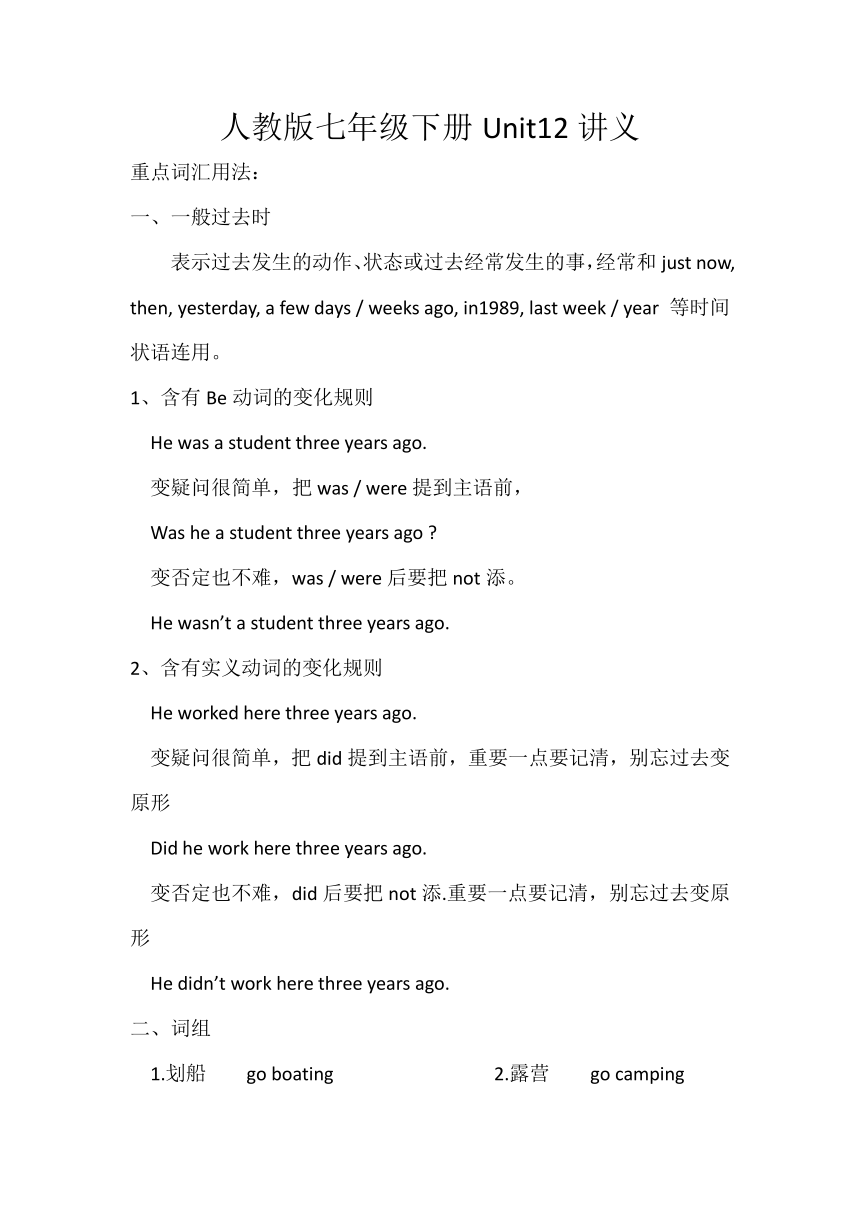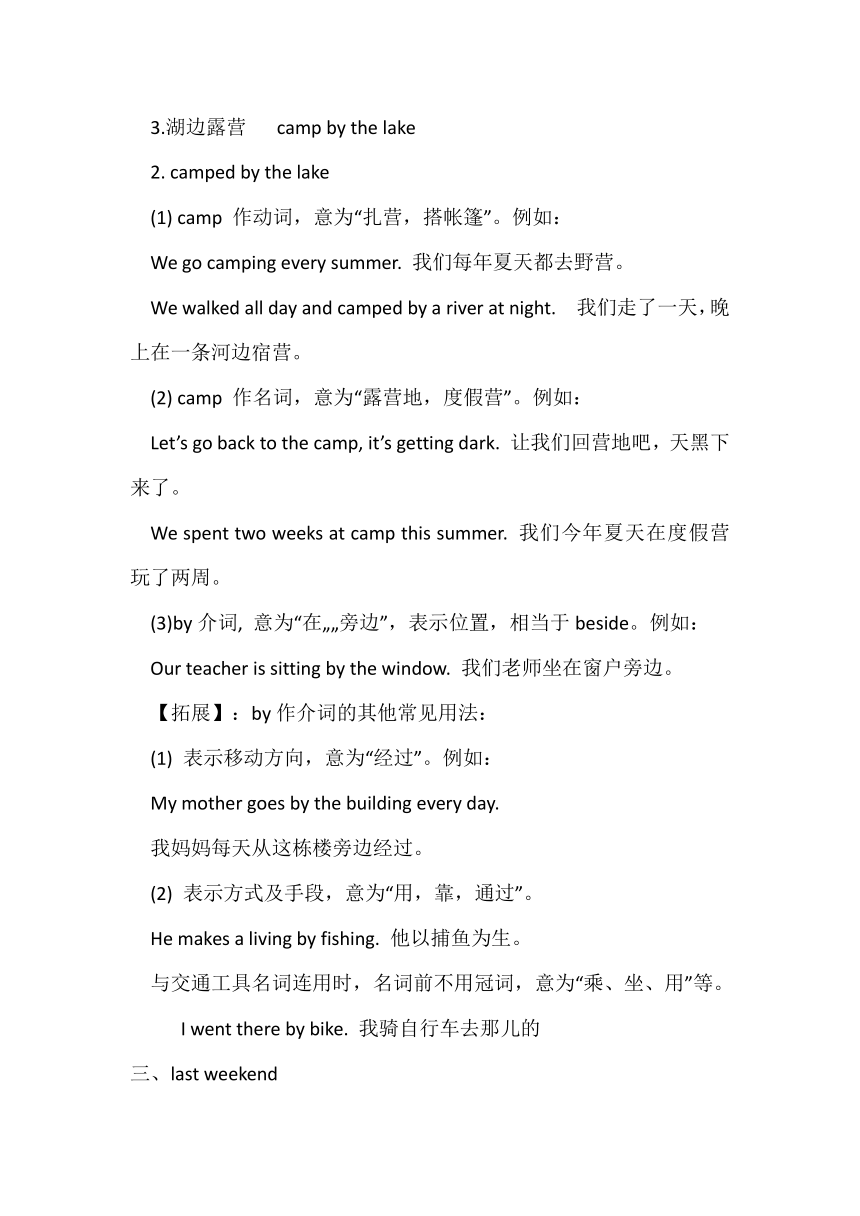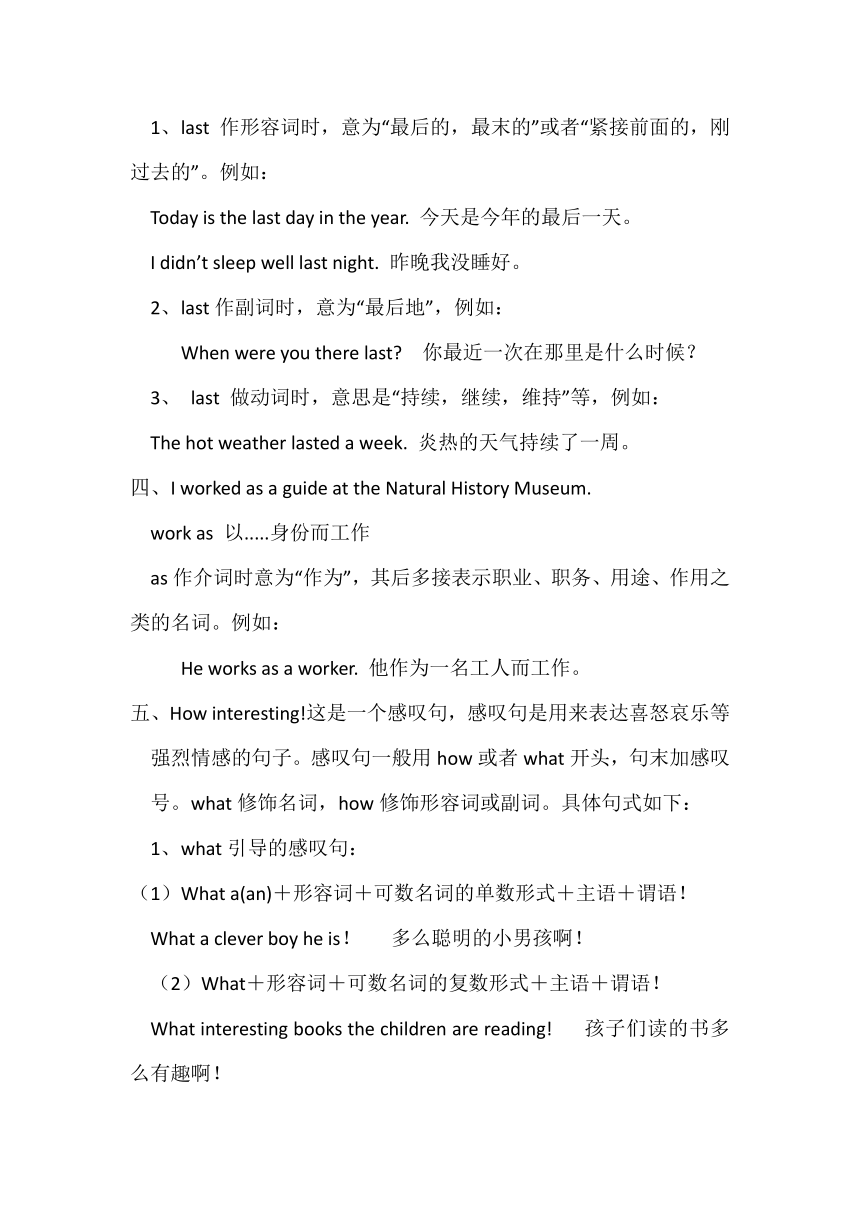Unit 12 What did you do last weekend? 重点词法及语法
文档属性
| 名称 | Unit 12 What did you do last weekend? 重点词法及语法 |  | |
| 格式 | docx | ||
| 文件大小 | 17.8KB | ||
| 资源类型 | 教案 | ||
| 版本资源 | 人教新目标(Go for it)版 | ||
| 科目 | 英语 | ||
| 更新时间 | 2023-06-04 08:24:18 | ||
图片预览



文档简介
人教版七年级下册Unit12讲义
重点词汇用法:
一般过去时
表示过去发生的动作、状态或过去经常发生的事,经常和just now, then, yesterday, a few days / weeks ago, in1989, last week / year 等时间状语连用。
1、含有Be动词的变化规则
He was a student three years ago.
变疑问很简单,把was / were提到主语前,
Was he a student three years ago
变否定也不难,was / were后要把not添。
He wasn’t a student three years ago.
含有实义动词的变化规则
He worked here three years ago.
变疑问很简单,把did提到主语前,重要一点要记清,别忘过去变原形
Did he work here three years ago.
变否定也不难,did后要把not添.重要一点要记清,别忘过去变原形
He didn’t work here three years ago.
词组
1.划船 go boating 2.露营 go camping
3.湖边露营 camp by the lake
2. camped by the lake
(1) camp 作动词,意为“扎营,搭帐篷”。例如:
We go camping every summer. 我们每年夏天都去野营。
We walked all day and camped by a river at night. 我们走了一天,晚上在一条河边宿营。
(2) camp 作名词,意为“露营地,度假营”。例如:
Let’s go back to the camp, it’s getting dark. 让我们回营地吧,天黑下来了。
We spent two weeks at camp this summer. 我们今年夏天在度假营玩了两周。
(3)by介词, 意为“在 旁边”,表示位置,相当于beside。例如:
Our teacher is sitting by the window. 我们老师坐在窗户旁边。
【拓展】:by作介词的其他常见用法:
(1) 表示移动方向,意为“经过”。例如:
My mother goes by the building every day.
我妈妈每天从这栋楼旁边经过。
(2) 表示方式及手段,意为“用,靠,通过”。
He makes a living by fishing. 他以捕鱼为生。
与交通工具名词连用时,名词前不用冠词,意为“乘、坐、用”等。
I went there by bike. 我骑自行车去那儿的
三、last weekend
1、last 作形容词时,意为“最后的,最末的”或者“紧接前面的,刚过去的”。例如:
Today is the last day in the year. 今天是今年的最后一天。
I didn’t sleep well last night. 昨晚我没睡好。
2、last作副词时,意为“最后地”,例如:
When were you there last 你最近一次在那里是什么时候?
3、 last 做动词时,意思是“持续,继续,维持”等,例如:
The hot weather lasted a week. 炎热的天气持续了一周。
四、I worked as a guide at the Natural History Museum.
work as 以.....身份而工作
as作介词时意为“作为”,其后多接表示职业、职务、用途、作用之类的名词。例如:
He works as a worker. 他作为一名工人而工作。
五、How interesting!这是一个感叹句,感叹句是用来表达喜怒哀乐等强烈情感的句子。感叹句一般用how或者what开头,句末加感叹号。what修饰名词,how修饰形容词或副词。具体句式如下:
1、what引导的感叹句:
(1)What a(an)+形容词+可数名词的单数形式+主语+谓语!
What a clever boy he is! 多么聪明的小男孩啊!
(2)What+形容词+可数名词的复数形式+主语+谓语!
What interesting books the children are reading! 孩子们读的书多么有趣啊!
(3)What+形容词+不可数名词+主语+谓语!
What cold weather it is!多冷的天!
2、how引导的感叹句:
(1)How+形容词或副词+主语+谓语!
How lovely the baby is!这孩子真可爱!(lovely为形容词)
How fast he runs! 他跑地多快啊!(fast为副词)
(2) How+形容词+a(an)+可数名词的单数形式+主语+谓语!
How heavy a box they are carrying! 他们抬的箱子多重啊!
(3)How+主语+谓语!
How time flies! 时间过得多快!
kinds of多种多样
A kind of一种
Kind of一点
七、stay up 意为“熬夜;不睡觉”;stay up late 意为“熬夜,睡的很晚”。
八、Who visited her grandma -Sally did.
本句的答语中的did是用来代替上文中的动词visited的。英语中为了避免不必要的重复,经常用do, does, did, so等来代替前面的动词或相关内容。例如:
-Do you like music 你喜欢音乐吗? -No, but my father does. (does= likes music)不,但是我父亲喜欢音乐。
-Do you think he is clever 你认为他聪明吗? -I think so.(so 代替he is clever)我认为如此。
-Did you pass the exam 你通过考试了吗?
-No, but my friend Lily did. (did等于passed the exam)没有,但是我的朋友Lily通过了。
九、There we put up our tents and made a fire to keep us warm.
put up意为“搭建,搭起”,着重指建造或搭起一个具有一定高度的具体的物体。set up与build也有此意。例如:
Let's put up the tent. 我们把帐篷搭起来吧。
【拓展】:put up还可意为“挂起,张贴;举起;抬起”之意。例如:
Please help me put up the picture. 请帮我挂起这幅画。
If you know the answer, please put up your hands. 如果知道答案,请举手。
make a fire 意为“生火”
each other相互
But I was so tired that I went to sleep early.
1、tired 形容词,意为“疲倦的,疲劳的,累的”,be tired of 意为“对 厌烦”。
He looks tired today. 他今天看起来很累。
She was tired of watching TV. 她看电视看得厌倦了。
【拓展】tiring 指“令人困倦的,使人疲劳的,累人的”。例如:
It was a long tiring day. 这一天让人感到又累又长。
2、so…that是如此……以至于……
She is so kind that all the students like her.
so that后加目的状语从句
He tries his best so that he can pass the exam.
十二、We shouted to our parents to let them know about the danger.
(1) shout 作动词,意为“呼喊(叫),大声说,叫嚷”。shout at意为“冲......大声嚷”,方式比较粗鲁;shout to意为“朝.....喊”,常因为距离远或者周围嘈杂而喊,目的让对方听见。例如:
She shouted at the old man. 她大声呵斥那老人。
He shouted to the old man. 他大声向那老人喊。
(2) 名词,意为“呼喊,叫喊”。例如:
What a terrible shout! 多可怕的叫喊声!
十三、start to do sth开始做某事
十四、wake up 意为“醒来”,是不及物动词词组,其后不能接表示人的名词或者代词。
The students usually wake up early.
wake sb up 意为“把某人叫醒”,是指一方把另一方叫醒或吵醒,wake 和up之间加表示人的名词或者代词。
Don't wake your father up. He is too tired.
move into移进,搬到某地常用move to + 地点
重点词汇用法:
一般过去时
表示过去发生的动作、状态或过去经常发生的事,经常和just now, then, yesterday, a few days / weeks ago, in1989, last week / year 等时间状语连用。
1、含有Be动词的变化规则
He was a student three years ago.
变疑问很简单,把was / were提到主语前,
Was he a student three years ago
变否定也不难,was / were后要把not添。
He wasn’t a student three years ago.
含有实义动词的变化规则
He worked here three years ago.
变疑问很简单,把did提到主语前,重要一点要记清,别忘过去变原形
Did he work here three years ago.
变否定也不难,did后要把not添.重要一点要记清,别忘过去变原形
He didn’t work here three years ago.
词组
1.划船 go boating 2.露营 go camping
3.湖边露营 camp by the lake
2. camped by the lake
(1) camp 作动词,意为“扎营,搭帐篷”。例如:
We go camping every summer. 我们每年夏天都去野营。
We walked all day and camped by a river at night. 我们走了一天,晚上在一条河边宿营。
(2) camp 作名词,意为“露营地,度假营”。例如:
Let’s go back to the camp, it’s getting dark. 让我们回营地吧,天黑下来了。
We spent two weeks at camp this summer. 我们今年夏天在度假营玩了两周。
(3)by介词, 意为“在 旁边”,表示位置,相当于beside。例如:
Our teacher is sitting by the window. 我们老师坐在窗户旁边。
【拓展】:by作介词的其他常见用法:
(1) 表示移动方向,意为“经过”。例如:
My mother goes by the building every day.
我妈妈每天从这栋楼旁边经过。
(2) 表示方式及手段,意为“用,靠,通过”。
He makes a living by fishing. 他以捕鱼为生。
与交通工具名词连用时,名词前不用冠词,意为“乘、坐、用”等。
I went there by bike. 我骑自行车去那儿的
三、last weekend
1、last 作形容词时,意为“最后的,最末的”或者“紧接前面的,刚过去的”。例如:
Today is the last day in the year. 今天是今年的最后一天。
I didn’t sleep well last night. 昨晚我没睡好。
2、last作副词时,意为“最后地”,例如:
When were you there last 你最近一次在那里是什么时候?
3、 last 做动词时,意思是“持续,继续,维持”等,例如:
The hot weather lasted a week. 炎热的天气持续了一周。
四、I worked as a guide at the Natural History Museum.
work as 以.....身份而工作
as作介词时意为“作为”,其后多接表示职业、职务、用途、作用之类的名词。例如:
He works as a worker. 他作为一名工人而工作。
五、How interesting!这是一个感叹句,感叹句是用来表达喜怒哀乐等强烈情感的句子。感叹句一般用how或者what开头,句末加感叹号。what修饰名词,how修饰形容词或副词。具体句式如下:
1、what引导的感叹句:
(1)What a(an)+形容词+可数名词的单数形式+主语+谓语!
What a clever boy he is! 多么聪明的小男孩啊!
(2)What+形容词+可数名词的复数形式+主语+谓语!
What interesting books the children are reading! 孩子们读的书多么有趣啊!
(3)What+形容词+不可数名词+主语+谓语!
What cold weather it is!多冷的天!
2、how引导的感叹句:
(1)How+形容词或副词+主语+谓语!
How lovely the baby is!这孩子真可爱!(lovely为形容词)
How fast he runs! 他跑地多快啊!(fast为副词)
(2) How+形容词+a(an)+可数名词的单数形式+主语+谓语!
How heavy a box they are carrying! 他们抬的箱子多重啊!
(3)How+主语+谓语!
How time flies! 时间过得多快!
kinds of多种多样
A kind of一种
Kind of一点
七、stay up 意为“熬夜;不睡觉”;stay up late 意为“熬夜,睡的很晚”。
八、Who visited her grandma -Sally did.
本句的答语中的did是用来代替上文中的动词visited的。英语中为了避免不必要的重复,经常用do, does, did, so等来代替前面的动词或相关内容。例如:
-Do you like music 你喜欢音乐吗? -No, but my father does. (does= likes music)不,但是我父亲喜欢音乐。
-Do you think he is clever 你认为他聪明吗? -I think so.(so 代替he is clever)我认为如此。
-Did you pass the exam 你通过考试了吗?
-No, but my friend Lily did. (did等于passed the exam)没有,但是我的朋友Lily通过了。
九、There we put up our tents and made a fire to keep us warm.
put up意为“搭建,搭起”,着重指建造或搭起一个具有一定高度的具体的物体。set up与build也有此意。例如:
Let's put up the tent. 我们把帐篷搭起来吧。
【拓展】:put up还可意为“挂起,张贴;举起;抬起”之意。例如:
Please help me put up the picture. 请帮我挂起这幅画。
If you know the answer, please put up your hands. 如果知道答案,请举手。
make a fire 意为“生火”
each other相互
But I was so tired that I went to sleep early.
1、tired 形容词,意为“疲倦的,疲劳的,累的”,be tired of 意为“对 厌烦”。
He looks tired today. 他今天看起来很累。
She was tired of watching TV. 她看电视看得厌倦了。
【拓展】tiring 指“令人困倦的,使人疲劳的,累人的”。例如:
It was a long tiring day. 这一天让人感到又累又长。
2、so…that是如此……以至于……
She is so kind that all the students like her.
so that后加目的状语从句
He tries his best so that he can pass the exam.
十二、We shouted to our parents to let them know about the danger.
(1) shout 作动词,意为“呼喊(叫),大声说,叫嚷”。shout at意为“冲......大声嚷”,方式比较粗鲁;shout to意为“朝.....喊”,常因为距离远或者周围嘈杂而喊,目的让对方听见。例如:
She shouted at the old man. 她大声呵斥那老人。
He shouted to the old man. 他大声向那老人喊。
(2) 名词,意为“呼喊,叫喊”。例如:
What a terrible shout! 多可怕的叫喊声!
十三、start to do sth开始做某事
十四、wake up 意为“醒来”,是不及物动词词组,其后不能接表示人的名词或者代词。
The students usually wake up early.
wake sb up 意为“把某人叫醒”,是指一方把另一方叫醒或吵醒,wake 和up之间加表示人的名词或者代词。
Don't wake your father up. He is too tired.
move into移进,搬到某地常用move to + 地点
同课章节目录
- Unit 1 Can you play the guitar?
- Section A
- Section B
- Unit 2 What time do you go to school?
- Section A
- Section B
- Unit 3 How do you get to school?
- Section A
- Section B
- Unit 4 Don't eat in class.
- Section A
- Section B
- Unit 5 Why do you like pandas?
- Section A
- Section B
- Unit 6 I'm watching TV.
- Section A
- Section B
- Review of Units 1-6
- Unit 7 It's raining!
- Section A
- Section B
- Unit 8 Is there a post office near here?
- Section A
- Section B
- Unit 9 What does he look like?
- Section A
- Section B
- Unit 10 I'd like some noodles.
- Section A
- Section B
- Unit 11 How was your school trip?
- Section A
- Section B
- Unit 12 What did you do last weekend?
- Section A
- Section B
